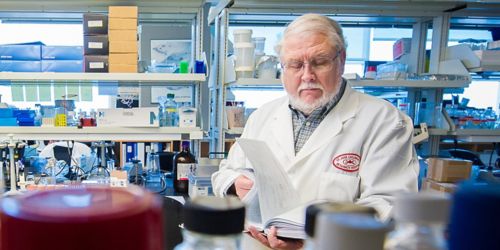St. Jude Family of Websites
Explore our cutting edge research, world-class patient care, career opportunities and more.
St. Jude Children's Research Hospital Home

- Fundraising
St. Jude Family of Websites
Explore our cutting edge research, world-class patient care, career opportunities and more.
St. Jude Children's Research Hospital Home

- Fundraising
Understanding fatty acids as signaling molecules for virulence factor production

Charles Rock, PhD, has found the virulence factor of Staphylococcus is dependent upon fatty acid activity.
Fatty acids are composed of long chains of carbons, and these greasy molecules are best known as the building blocks of biological membranes.
Scientists in the Department of Infectious Diseases show that fatty acids also function as signaling molecules that control the production of dozens of virulence factors in the bacterial pathogen, Staphylococcus aureus, a major cause of infections in hospitals. Virulence factors are proteins secreted by pathogens to attack human cells and evade the immune system.
A few years back, we discovered an enzyme called fatty acid kinase that is an essential first step in the incorporation of fatty acids into the membrane. We noted then that when fatty acid kinase is inactivated, the bacteria are not able to produce α-hemolysin, a virulence factor that causes human cells to explode (see figure).
In our current study, published in the scientific journal mBio, we show fatty acids act as a "kill switch" to inactivate a membrane-bound sensor kinase. This sensor kinase is responsible for initiating a phosphorylation cascade that leads to the transcriptional activation of dozens of virulence factors important for pathogenesis. When fatty acid kinase is shut off, fatty acids accumulate and virulence factor production ceases.
Fatty acid kinase keeps cellular fatty acid levels low and is responsible for maintaining virulence factor production when host fatty acids are encountered at the infection site.
The study uncovers a regulatory network that receives input from fatty acids encountered in the host. Infection studies in pre-clinical models are underway to determine if the inhibition of fatty acid kinase would be an appropriate therapeutic target to mitigate the destructive impact of virulence factors on host tissues.






